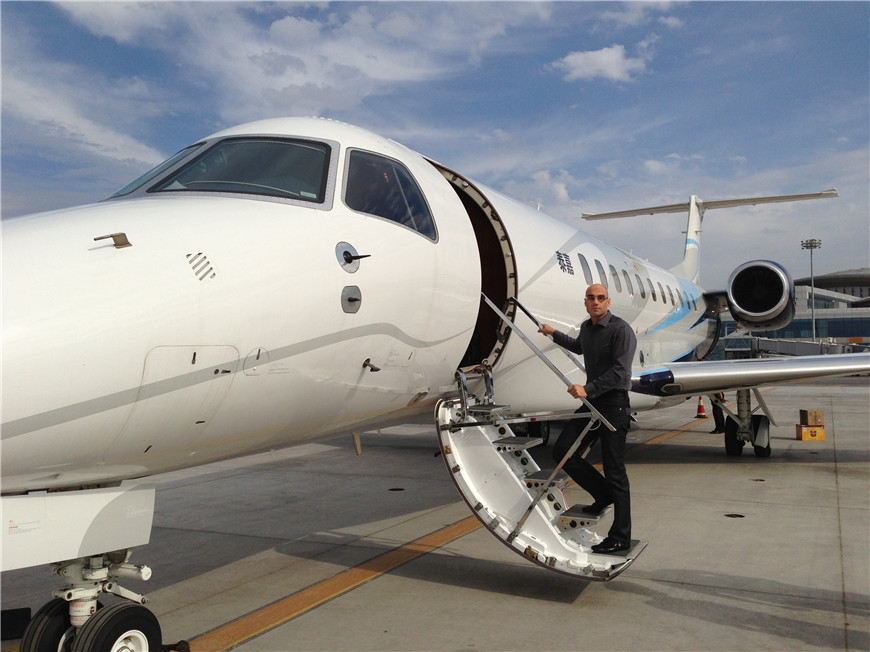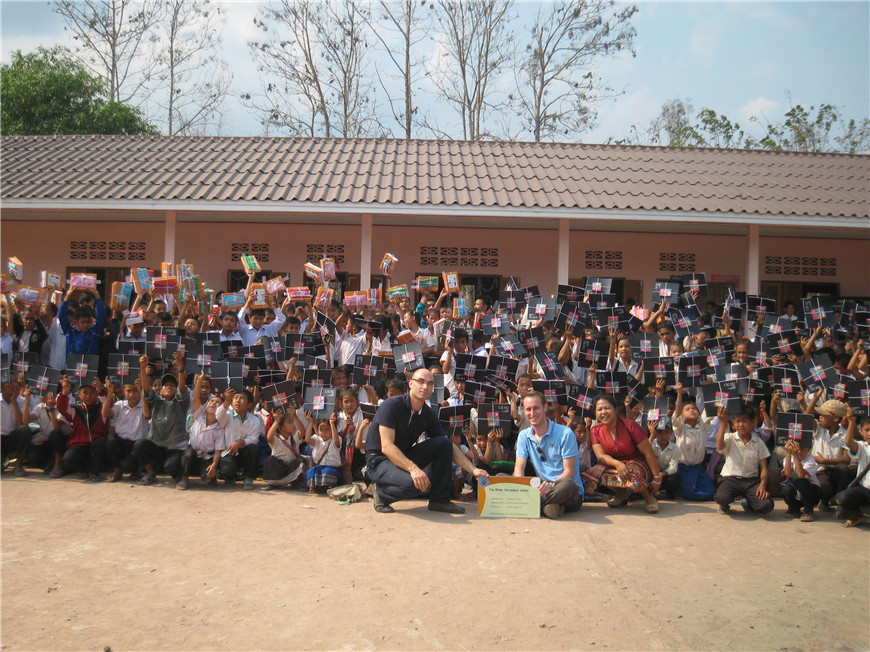Rebel with a Cause: GEMBA 2017's Stefan Greim

By Michael Thede
For CEIBS GEMBA17 student Stefan Greim, growing up in a region of Germany closely bordered by France and Switzerland meant experiencing first-hand the benefits of diversity, and learning that proximity offers many valuable opportunities for exchange between cultures. And, like most borders in that part of the world, his journey from the small town setting of his youth to the world of ultra-high-net-worth personal banking, and eventually to CEIBS followed anything but a straight line.
“My background has a lot of twists and turns because I rebelled a little bit when I was young,” he says. “I always wanted to go against the mainstream and I enjoyed doing completely the opposite from what others did.”
The impulse to break from the pack coupled with an enjoyment of physical work, led Greim to drop out of school at a young age and pursue a path as an electronics technician. After working his way up from an apprentice to a supervisor position in just a few years, however, boredom and the need for change conspired to direct his interest in a completely different direction.
“I’d read about Asia and I felt the region was very fascinating,” he says. “So, I went to the local Chamber of Commerce and became actively engaged in friendship associations, which were basically with China and Switzerland because [in the case of the latter] we're living close to the border.”
GOING AGAINST THE FLOW
Inspired by the interactions he had at the friendship associations and guided by what he admits was a mix of both adventurousness and immaturity, Greim first landed in the Middle Kingdom in 1991. His goal: a personal fact-finding mission. At the time, his decision to focus on China was an unusual one, as most foreign businesses were gearing their Asian strategies towards the Japanese market.
“When I arrived in Beijing for the first time, I wasn’t able to speak the language and I barely made my way to the guesthouse where I was staying. Then, right after I arrived, a sandstorm blew in and everything was covered in dust and dirt,” he recollects. “I wasn’t able to understand anyone, nobody was able to understand me, and I really started asking myself, what are you doing here? I thought this was not a place where I could ever achieve anything.”
 Nevertheless, over the course of the next few years, Greim continued to travel back and forth between Europe and China, during which time he co-founded a joint venture, completed an exchange semester at Beijing Foreign Language University, and was accepted as the first ever Western intern at the Chinese Chamber for the Promotion of International Trade (CCPIT). Among other things, his experience gave him valuable insight into the differences in working procedures between Chinese and Western organizations.
Nevertheless, over the course of the next few years, Greim continued to travel back and forth between Europe and China, during which time he co-founded a joint venture, completed an exchange semester at Beijing Foreign Language University, and was accepted as the first ever Western intern at the Chinese Chamber for the Promotion of International Trade (CCPIT). Among other things, his experience gave him valuable insight into the differences in working procedures between Chinese and Western organizations.
In 2001, after completing a Masters in Applied Economics & Business Administration at Gerhard Mercator University Duisburg-Essen, Greim (much to even his own surprise) became a banker, joining Credit Suisse’s team responsible for Asian VIP clients in Switzerland. Two years later, following a brief stint in Hong Kong, he was transferred to Beijing where he took up position as the company’s first ever representative for its Private Banking Division there. Starting out as a “one man show” meant both embracing a pioneering spirit and taking a proactive approach to growing the business. At the same time, it also necessitated making some important cultural adjustments.
“For me, personally, one of the major challenges related to the distinction between private life and business life that we are used to having in Europe, especially in Germany,” he says. “It was completely turned upside down. There was no barrier between private life and corporate life. People would call you 24/7. There was no weekend.”
Eventually, Greim’s work led him back to Hong Kong, where he was again entrusted by Credit Suisse to hire, train, and manage an entirely new team for China coverage from the ground up. Under his guidance as Executive Director, the team enjoyed a great deal of success, exceeding its given targets every year between 2013 and 2018. While his experience brought him into close contact with many of the wealthiest people in China, it also taught him there exists a very fine line between success and failure.
“In my job I’ve had the privilege of visiting every province in China but two. I saw a lot of wealth, but I also witnessed a lot of hardship,” he says. “It has made me aware that we all have a responsibility. A responsibility to help others, especially less advantaged people, if we can, to the extent we can.”
GETTING FIT FOR THE FUTURE
 In part, the desire to make an impact on the lives of others pointed Greim to a major life change — one that involved taking a step back from the work on which he had built his career. Furthermore, wanting to gain a broader perspective and knowing he would need to get mentally fit for the challenges ahead, he decided to apply for the Global Executive MBA programme at CEIBS.
In part, the desire to make an impact on the lives of others pointed Greim to a major life change — one that involved taking a step back from the work on which he had built his career. Furthermore, wanting to gain a broader perspective and knowing he would need to get mentally fit for the challenges ahead, he decided to apply for the Global Executive MBA programme at CEIBS.
“The nice thing about CEIBS and one of the reasons why I chose the school is that you have diversity here,” he states. “If I went to Hong Kong, for example, most of my classmates would be from the banking or insurance industry. Here you have, and can learn from, people from every industry because every industry has different best practices which you can take away and apply to your own work.”
Since joining CEIBS, Greim says he has discovered a great deal of camaraderie among both students and alumni. At the same time, he admits the intensity of the experience at CEIBS has been both an eye-opener and a catalyst for learning more about himself.
“For me, definitely one of the biggest challenges was the time. If you really want to do it seriously and you want to take something away, then you have to be really invested in the programme,” he says. “I’ve been willing to invest the time to get the best out of it. Coming from the banking industry, I would say it's a ‘high return investment’.”
COMING HOME
Now, nearly 28 years since first stepping off a plane in Beijing, Greim says returning to China leaves him with a kind of “coming home feeling”. Bilingual signage, well-organised transportation, sleek infrastructure, and other modern amenities serve as a testament to the enormous change and development the country has experienced since the early-1990s. Perhaps more importantly, he adds, they stand as a reminder of the effect the country has had on him personally.
“I think I’ve become very Chinese. I mean, China has changed me and my job has changed me as well,” he reflects. “For the last at least 15 years, I’ve had the privilege to work with the most successful and wealthiest people in China. My experience taught me a high level of patience, tolerance and the ability to adapt to the thoughts and values of a different culture.”
Looking ahead, Greim is already starting to focus on launching new ventures. At the same time, he says he is determined to bring people from China and elsewhere together to promote exchanges and to try to build bridges, so others might share in some of the same success he has experienced himself.
“If I claimed, in retrospect, that I had envisaged the stunning development China experienced during the last 20 years, it would probably not be the entire truth,” he admits. “But, what I can proudly say is that I’ve never regretted my early move to become familiar with China, its amazing people, and magnificent culture.”
 CHINA TIPS
CHINA TIPS
Q: People talk a lot about the importance of relationships in pretty much every aspect of business and life in China. What do you think the key is to building relationships here?
SG: In my career, relationships were one of the most important success factors. How I’ve approached building relationships in banking, but also in my private life, is to be honest and long-term oriented. If you approach someone and you only think about what kind of business or short term benefit that person represents to you, you’re already doomed to fail. If I approach someone, I’m always thinking, “What can I offer this person first? How can I invest in building a relationship with this person?” If we can do business that’s fine, if we can be friends that’s even better. If we are friends and doing business together, that’s the best we can achieve. In addition, one should not forget that every successful relationship also requires a diligent maintenance process over time, in particular, if the interaction is not very frequent.
Q: Do you have any tips for Chinese people who are working with foreigners that have come to China?
SG: The foreigners I know have usually been sent to China by their employer. For them, especially during the commencement of their term, it's really a new and unfamiliar environment. On one hand, they have to dive into something they're not familiar with and are completely out of their comfort zone. On the other hand, they’ve been given a huge target from their head office, so they’re under quite some pressure to deliver. So my advice would be, try to avoid frequent and sudden changes in working procedures and agreements or clearly communicate the reasons for any necessary changes by explaining the obvious advantages. An element of stability will help to bring them back into their comfort zone. Also, it has proved to be helpful to engage with them proactively on a more personal level. You can share common activities, topics, family related experiences, even a discussion over a beer — you’ll be surprised that there are much more commonalities than differences.















